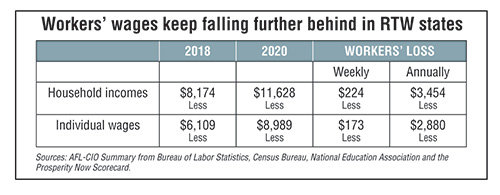Voters rejected RTW in Missouri in 2018, but Republican lawmakers want to try again
 How would you like to earn $11,628 LESS a year– $224 LESS a week? How would that impact your family budget?
How would you like to earn $11,628 LESS a year– $224 LESS a week? How would that impact your family budget?
That’s what’s happening to workers’ wages in the so-called “right-to-work” (RTW) states. And as bad as that financial reality was in 2018, when Missouri voters overwhelming rejected Missouri’s phony, anti-worker RTW law with 68 percent of the vote, it’s gotten WORSE since then.
The phrase “right-to-work” (for less) takes on an even more disastrous meaning in the latest data from the AFL-CIO obtained by the Labor Tribune.
WORSE WAGES IN RTW VS. FREE STATES
 In comparing annual wages in RTW states versus free states like Missouri:
In comparing annual wages in RTW states versus free states like Missouri:
- Household incomes: $11,625 LESS a year ($224 LESS a week) in RTW states. In 2018, the difference was $8,174 LESS a year.
- Individual wages: $8,989 LESS a year ($173 LESS a week). In 2018, it was $6,109 LESS a year.
“What’s really important is that these numbers are not just union wages, but union and non-union wages alike, making the point that this phony law hurts ALL workers,” said Pat White, president of the Greater St. Louis Labor Council. “The opposite side of that coin is that all workers, regardless of any union affiliation, do better without RTW.
“When it comes to having a voice on the job, where we can bargain for wages, benefits and critical issues like job safety, the impact of unions benefit everyone, not just union members,” White said. “The old saying ‘A rising tide lifts all boats’ is what having strong unions is all about. These numbers make clear what not having strong unions really means for working families.”
LATEST MISSOURI EFFORT
Despite Missouri voters’ overwhelming rejection of RTW in 2018, Republican Senators Jason Bean and Eric Burlison and Republican Rep. Jered Taylor have filed new proposals in this session to establish a statewide RTW law (SB73, SB18 and HB87).
In the House, Republican Rep. Don Rone has filed a measure that would allow local municipalities to pass local RTW laws. A similar measure was established in Illinois under former governor Bruce Rauner. Only the Village of Lincolnshire, near Chicago actually voted to create a RTW zone, but its ordinance was struck down in federal court. The Democratic majority Illinois Legislature, under Gov. J.B. Pritzker, in 2019 passed a law making local RTW zones illegal.
“We fight hard enough to win decent wages and benefits for our members. We don’t need legislators creating laws that make it worse for working families, especially phony ‘right-to-work’ laws,” said John Stiffler, executive secretary-treasurer of the St. Louis Building Trades Council. “We beat it overwhelmingly in 2018. It’s a slap in the face to Missouri voters everywhere.”
ILLINOIS’S RTW ZONES
Totsie Bailey, executive secretary-treasurer of the Southwestern Illinois Building Trades Council, said the new numbers from the AFL-CIO on RTW’s negative impact on working families reinforce the reasoning behind Illinois’s rejection of RTW zones and why pro-Labor Gov. Pritzker was right to sign the law prohibiting municipalities from passing local RTW ordinances.
“These new numbers make it clear that we want no part of that BS law in Illinois,” Bailey said. “We have a governor now who will make sure it doesn’t happen, so good riddance.”
OTHER NEGATIVE IMPACTS
In addition to the negative financial impact of RTW laws in 2020, the AFL-CIO notes:
- Workplace deaths are 37 percent HIGHER in RTW vs. free states.
- Workers younger than 65 in RTW states are more likely to NOT have health insurance than the same workers in free states.
- Poverty rates for workers and children in RTW states are HIGHER than in free states.
- RTW states spend 31.6 percent LESS per student for elementary and secondary education.
(Source: Data for this story was compiled by the AFL-CIO using the latest reports from the Bureau of Labor Statistics, Census Bureau, National Education Association and the Prosperity Now Scorecard.)


